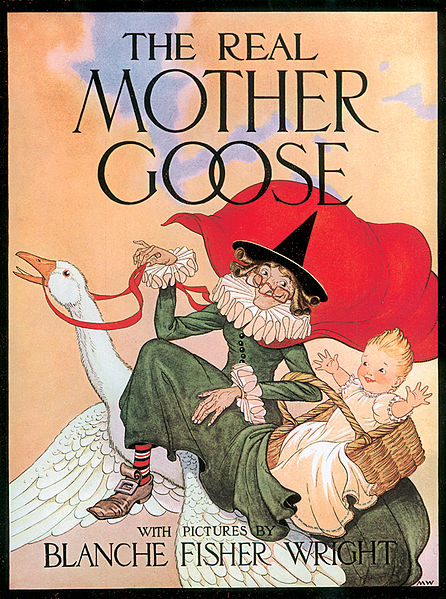 |
| The fictional author of many nursery rhymes (Wikipedia) |
Note: I learned nursery rhymes before I could read, and still remember most of them! They're great for memorization, and--if you find the melodies--are fun to sing!
Get Ready: Are there little rhymes and lullabies that children learn in your culture? Or, if you are an English speaker, do you know some nursery rhymes?
I have written before about common English expressions found in the works of William Shakespeare. This is the "high end" of literature.
But not so many years ago, most English-speaking children grew up learning another body of literature: Mother Goose nursery rhymes.
First appearing in Europe over 300 years ago, the rhymes are probably much older, passed on by word of mouth over generations. Once published, they caught on quickly and became perennial favorites. When I was a boy, I learned many of them by heart. Some of their lines are still used as titles of books and movies, such as Robert Penn Warren's All the King's Men and numerous books by Agatha Christie, including A Pocket Full of Rye (from "Sing a Song of Sixpence.")
There are dozens or even hundreds of nursery rhymes, but here is a list of some of the most popular ones. See how many you can identify (or recite!):
- Baa, Baa, Black Sheep
- Cat and the Fiddle, The
- Goosey, Goosey, Gander
- Humpty Dumpty
- Jack Be Nimble
- Jack and Jill
- Jack Sprat
- Ladybird
- Little Bo-Peep
- Little Boy Blue
- Little Jack Horner
- Mary, Mary, Quite Contrary
- Little Miss Muffet
- Mouse and the Clock, The
- Old Mother Hubbard
- Pumpkin-Eater, The
- Rock-a-Bye, Baby
- Simple Simon
- Sing a Song of Sixpence
- There was an Old Woman Who Lived in a Shoe
- Three Blind Mice
- Twinkle, Twinkle, Little Star
- Wee Willie Winkie
Some nursery rhymes have melodies, and can be sung. Others have actions. For example, when we say "This Little Piggy Went to Market," we wiggle the child's toes (starting with the big toe) for each line:
This little piggy went to market;
This little piggy stayed at home;
This little piggy had roast beef;
And this little pig had none;
This little piggy said, "Wee, wee, wee!" all the way home!
I recommend that you learn some of these rhymes by heart. They can make learning English easy and fun--for adults and children!
--------Read more: https://en.wikipedia.org/wiki/Mother_Goose
Don't forget: I've posted ten nursery rhymes for you here.
Practice: Here are ten expressions. Which rhyme did each one come from? Use the letter next to each name above for your answer. If you're not sure, check this page I made just for you! (answers below)
- All the king's horses and all the king's men
- Jack fell down and broke his crown
- Along came a spider
- The cupboard was bare
- She had so many children, she didn't know what to do
- See how they run!
- Like a diamond in the sky
- When the bough breaks, the cradle will fall
- What a good boy am I!
- His wife could eat no lean
Answers are in the first comment below.
Submitted to the Shenzhen Daily for October 7, 2007
This lesson received 374 visits on my old site between December, 2011, and June, 2021.


Answers to the Practice: 1. d Humpty Dumpty; 2. f Jack and Jill; 3. m Little Miss Muffet; 4. o Old Mother Hubbard; 5. t There Was an Old Woman Who Lived in a Shoe; 6. u Three Blind Mice; 7. v Twinkle, Twinkle, Little Star; 8. q Rock-a-Bye, Baby; 9. k Little Jack Horner; 10. g Jack Sprat
ReplyDelete